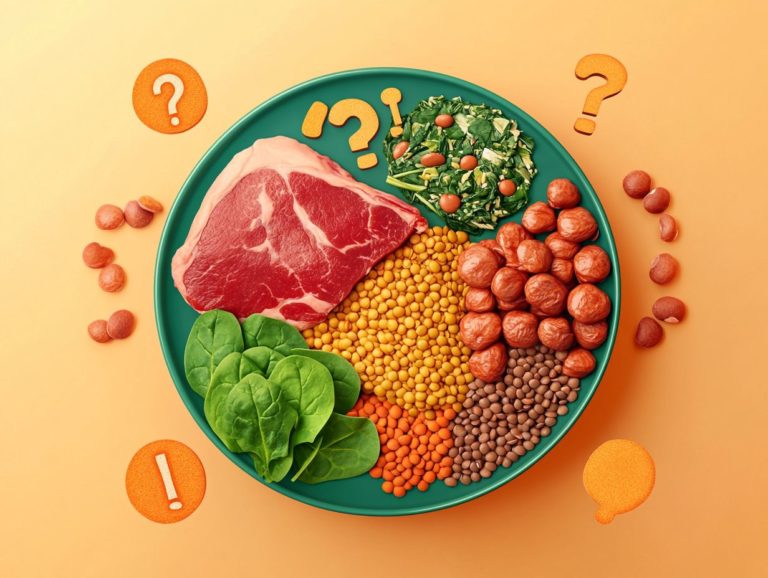Are Detox Diets Effective? Myths Explored
Detox diets have surged in popularity, enticing you with promises of everything from weight loss to enhanced energy levels. But how much of this hype is actually grounded in reality?
This article delves into the true purpose and claims of detox diets, debunking common myths along the way. It examines the various types of detox diets and their potential benefits. However, it s not all sunshine and rainbows; we also discuss the risks involved and crucial factors you should consider before embarking on a detox journey.
Prepare to uncover the truth behind detox diets.
Contents
Key Takeaways:

Detox diets are not a one-size-fits-all solution and may have varying effects on individuals.
The benefits of detox diets are largely anecdotal, and more research is needed to support their effectiveness.
Detox diets may have potential risks and should be approached with caution, taking into consideration factors such as overall health and medical history.
The Truth About Detox Diets
The realm of detox diets is filled with many claims regarding detoxification methods, each promising an array of health benefits. However, the reality often reveals itself beneath the glossy marketing tactics employed by the health industry.
Many detox diets claim to eliminate harmful toxins and enhance overall wellness. Yet, a closer examination reveals that these assertions frequently lack strong scientific support and, in some cases, may even pose health risks rather than benefits.
It s essential for you to understand the detoxification process, which is the body’s way of removing harmful substances, and discern the truths behind detox myths, especially if you’re contemplating a detox diet or product.
Understanding the Purpose and Claims
The primary purpose of detox diets is to support your body’s natural detoxification processes while claiming to eliminate the toxins that accumulate from fast-food habits and environmental pollutants.
Proponents of these diets assert that you can experience improved metabolic health, enhanced energy levels, and even weight loss. They often mention benefits for liver health, suggesting that foods like milk thistle, known for its protective properties, and beetroot, which supports liver function, can help eliminate harmful substances.
Many advocates of detoxification also emphasize the benefits of improved kidney function. Increased fluid intake and specific dietary choices are believed to promote better waste filtration.
While you might be drawn to natural detox methods like juice cleanses and herbal teas, the rise of dietary supplements reveals a growing interest in more convenient options to achieve these health benefits.
Common Myths About Detox Diets

Despite their acclaim in the health industry, detox diets are often surrounded by misinformation and myths that can mislead you about their effectiveness and safety.
Dispelling Misconceptions
Many misconceptions about detox diets lead people to believe they are a miraculous shortcut to weight loss and a quick fix for health improvements through a brief cleanse. This oversimplification overlooks the intricate detoxification processes that your body, especially your liver and kidneys, continuously perform.
These organs expertly filter and eliminate toxins, showcasing your body s remarkable ability to manage its own cleansing provided you support it with a balanced diet rich in whole foods, fiber, and essential nutrients.
Detox products often marketed as easy solutions may lack scientific evidence and can disrupt your body s natural rhythms, ultimately causing more harm than good.
Therefore, setting realistic expectations about health enhancements means recognizing that lasting lifestyle changes are significantly more effective than fleeting detox regimens.
Types of Detox Diets
Detox diets manifest in various forms, each designed to promote detoxification through different methods. From juice cleanses to fasting, and even the incorporation of specific detox foods believed to facilitate the cleansing process, there s a tailored approach awaiting your exploration.
Exploring Different Approaches

Detox diets offer various approaches, such as juice cleanses, colon cleansing, and dietary supplements. Each method has supporters and critics, contributing to the ongoing discussion.
These methods are often marketed as quick solutions to help eliminate toxins, boost energy, and lose weight. For example, juice cleanses focus on consuming nutrient-rich vegetable and fruit juices, claiming to enhance your body’s natural detox systems.
On the other hand, colon cleansing promotes the idea that flushing the colon can cleanse the digestive tract, although the effectiveness and necessity of this practice are widely debated.
Dietary supplements, ranging from herbal tonics to fiber powders, claim to support bodily functions and improve metabolism. Each detox method uniquely impacts your body, raising important questions about their long-term safety and actual health benefits.
Potential Benefits of Detox Diets
Supporters of detox diets often highlight appealing health benefits like weight loss, improved liver health, and enhanced metabolic function.
They suggest these diets rejuvenate your body by effectively eliminating toxins, positioning detoxification as a pathway to overall wellness.
Possible Positive Effects on Health
While detox diets have many claims, some studies indicate they may positively impact liver enzymes and enhance kidney function.
These effects are often linked to the increased intake of fruits and vegetables typically featured in detox programs, known for their rich antioxidants and essential nutrients.
Research shows that a diet high in these food groups can boost metabolism and aid weight management, contributing to overall wellness.
Certain detox diets may help reduce inflammation in the body, a factor related to various chronic diseases.
By potentially improving gut health and supporting natural elimination processes, these diets offer a promising avenue for metabolic health that deserves further exploration in the scientific community.
Potential Risks of Detox Diets

While detox diets claim many benefits, they can also pose serious health risks, especially when involving extreme practices like colon cleansing or excessive alcohol consumption for quick results.
Considering the Downsides
Carefully consider the downsides of detox diets, including nutritional imbalances and psychological effects, as well as the risk of falling for detox scams.
While these trendy diets promise quick weight loss or a thorough cleanse, the reality often falls short of expectations. Eliminating entire food groups can lead to nutritional deficiencies, depriving your body of essential vitamins and minerals.
The rigid structure of detox diets can create emotional challenges. This makes it hard to maintain a healthy relationship with food. Additionally, the pressure to meet unrealistic standards can result in feelings of guilt and failure when outcomes don t match expectations, further complicating your well-being.
Factors to Consider Before Trying a Detox Diet
Before starting a detox diet, consider key factors related to safety, effectiveness, and nutritional balance.
This careful consideration ensures that your chosen method is genuinely beneficial rather than potentially harmful.
Have you tried a detox diet? Share your experiences below!
Important Considerations for Safety and Effectiveness
Ensuring safety and effectiveness in detox diets requires a clear understanding of nutritional balance. This means ensuring you get a variety of nutrients your body needs and an awareness of the potential health risks tied to various claims about detoxing.
As you understand your options, it’s crucial to prioritize a well-rounded intake of essential nutrients. Be cautious of extreme restrictions that may lead to deficiencies. It’s wise to consult medical professionals or registered dietitians before starting detox diets; they can offer tailored advice and assess your individual health conditions.
Stay skeptical of detox programs that promise rapid results or employ misleading marketing tactics. These approaches can be ineffective and might also jeopardize your well-being. Adopting a mindful and educated approach ultimately protects your health while striving for a cleaner lifestyle.
Frequently Asked Questions
What is a detox diet?
A detox diet is a short-term dietary plan aimed at eliminating toxins from the body and promoting weight loss. It typically involves consuming a limited number of foods and drinks for a specific period of time.
Are detox diets effective for weight loss?
While detox diets may lead to initial weight loss, this is usually due to restricted calorie intake and water weight loss, rather than long-term fat loss. These diets are not sustainable for long-term weight loss and may even result in weight gain once normal eating habits are resumed.
Do detox diets help to flush out toxins from the body?
There is no scientific evidence to support the claim that detox diets can effectively rid the body of toxins. Our liver, kidneys, and skin are the main organs responsible for removing toxins from the body, and they are constantly doing so without the need for any special diet.
Are there any potential risks associated with detox diets?
Yes, detox diets can be risky for some individuals. They may lead to inadequate nutrient intake, which can cause deficiencies and negatively impact overall health. They may also be harmful for people with certain medical conditions, such as diabetes or kidney disease.
Can detox diets improve overall health and well-being?
While detox diets may make some individuals feel better in the short term due to changes in eating habits, there is no evidence to suggest they have long-term health benefits. In fact, extreme detox diets can do more harm than good and should be avoided.
Are there any healthier alternatives to detox diets?
Yes, instead of a strict detox, why not embrace a balanced diet that supports your health every day? This can include regularly eating a nutritious diet, staying hydrated, exercising regularly, and getting enough sleep. These habits can help support your body’s natural detox process without the potential risks and negative impacts of detox diets.
It’s crucial to prioritize health and consult with professionals to ensure safe dietary decisions.






